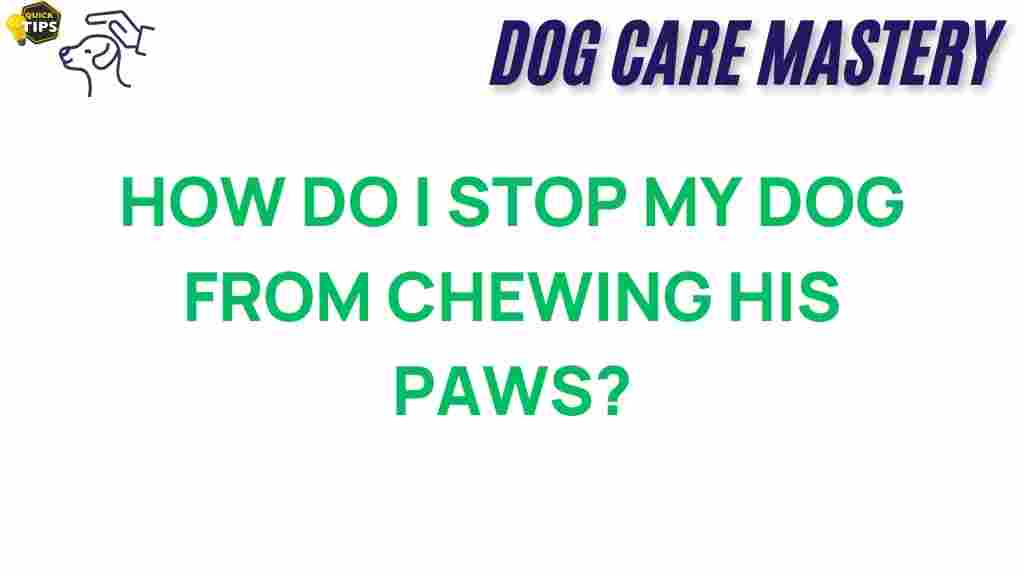Unraveling the Mystery: Why Is Your Dog Chewing His Paws?
As a dog owner, you may have noticed your furry friend spending an unusual amount of time chewing his paws. This behavior can be puzzling and concerning, leading many dog owners to wonder about the reasons behind it. Understanding why your dog is chewing can help you address the issue appropriately and ensure your pet remains happy and healthy.
The Basics of Dog Chewing
Dog chewing is a common behavior, but when it becomes excessive, it can signal underlying issues. Dogs chew for various reasons, including boredom, anxiety, or even health problems. When the chewing is focused on their paws, it can raise red flags that should not be ignored.
In this article, we will explore the common reasons for dog chewing, how to identify the cause, and what you can do to help your pet. By understanding the motives behind this behavior, you can take the necessary steps to alleviate your dog’s discomfort.
Common Reasons for Dog Chewing
Here are some of the most prevalent causes of dog chewing:
- Allergies: Dogs can suffer from allergies just like humans. Environmental allergens, food allergies, or flea allergies can lead to itchy skin and paws, prompting your dog to chew to relieve discomfort.
- Infections: Bacterial or fungal infections can cause inflammation and pain, leading to chewing. If your dog’s paws are red, swollen, or have an unusual odor, this could be the culprit.
- Parasites: Fleas, ticks, and mites can cause itching and irritation, resulting in your dog chewing his paws as a reaction to the bites or irritation.
- Anxiety or Boredom: Dogs are social creatures, and if they feel lonely or anxious, they may resort to chewing as a coping mechanism. Lack of exercise and mental stimulation can also lead to boredom-induced chewing.
- Paw Injuries: If your dog has an injury or a foreign object lodged in his paw, he may chew to alleviate pain or discomfort.
- Habitual Behavior: Sometimes, dogs develop habits that can lead to excessive chewing, even if there is no underlying health issue.
Identifying the Cause
To determine why your dog is chewing his paws, consider the following steps:
- Observe: Keep a close eye on your dog’s chewing behavior. Note when it happens, how often, and whether there are any accompanying symptoms like redness, swelling, or discharge.
- Check for Allergies: Consider if your dog has been exposed to new foods, cleaning products, or environmental changes that could trigger allergies.
- Examine the Paws: Look for any signs of injury, swelling, or foreign objects. Check between the toes and the pads for any irritants.
- Consult Your Vet: If the chewing persists or is accompanied by other concerning symptoms, consult your veterinarian for a thorough examination.
Troubleshooting Tips for Dog Chewing
If you’ve identified the reason for your dog’s chewing, you can take steps to correct the behavior. Here are some troubleshooting tips:
1. Treat Allergies
- Consult with your veterinarian to identify the allergen and discuss appropriate treatments, such as antihistamines or dietary changes.
- Consider switching to hypoallergenic dog food if food allergies are suspected.
2. Address Infections
- If your dog has an infection, your vet may prescribe antibiotics or antifungal medications to treat the issue.
- Keep the affected area clean and dry to promote healing.
3. Eliminate Parasites
- Use veterinarian-recommended flea and tick prevention treatments to keep your dog free from parasites.
- Regularly check your dog’s coat and skin for signs of infestations.
4. Manage Anxiety and Boredom
- Provide plenty of exercise and mental stimulation through walks, playtime, and interactive toys.
- Consider using calming aids, such as anxiety wraps or pheromone diffusers.
5. Treat Injuries
- If you suspect an injury, take your dog to the vet for an evaluation and appropriate treatment.
- Keep your dog’s paws clean and avoid letting him lick or chew on any wounds.
6. Break the Habit
- If chewing has turned into a habit, redirect your dog’s attention to more appropriate activities, such as chewing on toys.
- Use positive reinforcement to reward your dog for not chewing his paws.
When to Seek Professional Help
If your dog’s chewing persists despite your efforts to manage the issue, it may be time to consult a professional. A veterinarian or a certified animal behaviorist can help you identify the root cause of the problem and develop a tailored plan for addressing it.
Keep in mind that chronic chewing can lead to secondary skin infections or other health issues, so early intervention is crucial.
Conclusion: Taking Action Against Dog Chewing
Understanding the reasons behind your dog chewing his paws is essential for ensuring his well-being. By identifying the cause and taking appropriate action, you can help alleviate your pet’s discomfort and prevent further complications. Regular veterinary visits, a balanced diet, and plenty of exercise and mental stimulation are key components to keeping your dog happy and healthy.
If you’re still unsure about your dog’s behavior or need additional support, don’t hesitate to seek advice from professionals. Your dog relies on you to advocate for his health and happiness, so take the necessary steps to address any concerns.
For more information on dog behaviors and care tips, check out our comprehensive guide on dog health and wellness.
For more details on pet care, visit the American Kennel Club for expert advice and resources.
This article is in the category Behavior and created by dogcaremastery Team
